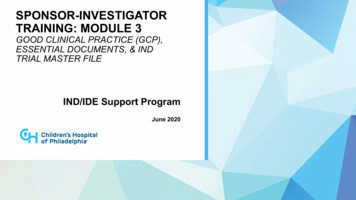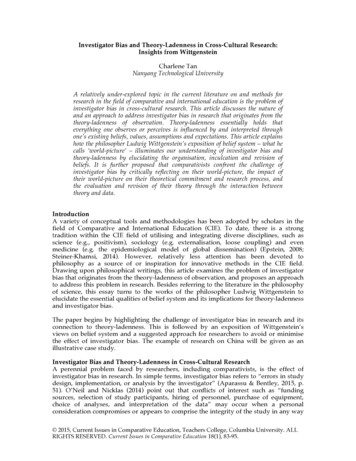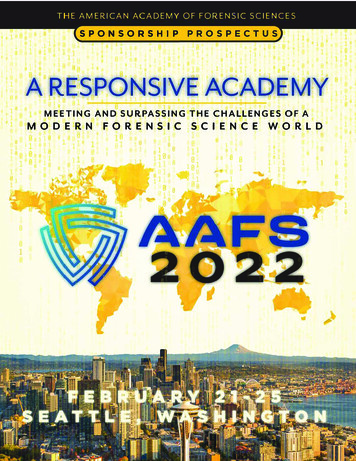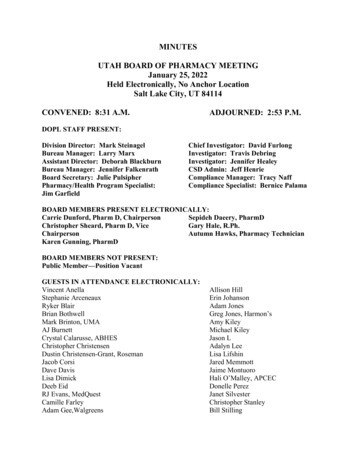
Transcription
SPONSOR-INVESTIGATORTRAINING: MODULE 3GOOD CLINICAL PRACTICE (GCP),ESSENTIAL DOCUMENTS, & INDTRIAL MASTER FILEIND/IDE Support ProgramJune 2020
STUDY RECORDS Sponsor IDE Maintenance Selecting/Informing siteinvestigators Monitoring Device Records/ControlTrial MasterFile2 Investigator Protocol Maintenance Compliance IRB review Selecting/Informing subjects Device Records/Control Subject Case HistoriesRegulatoryBinder
ESSENTIAL DOCUMENTS: ICH E6 SECTION 8 Essential Documents are study documents which: Allow for the evaluation of the trial and of the data produced Show that the Sponsor, Investigator, and Monitor all follow Good ClinicalPractice (GCP) and other applicable regulatory requirements Are usually audited by monitors and inspected by the FDA to: Ensure the study was conducted appropriately Confirm data integrity Should be filed timely, as audits and inspections can happen at any time.3
ESSENTIAL DOCUMENTS: ICH E6 SECTION 8 The minimum list of essential documents is grouped according tothe stage of the trial during which they will normally be generated: before the clinical phase of the trial starts during the clinical conduct of the trial after completion or termination of the trial Description of each document and what it is for, as well as where it should be filed(sponsor files, institution files, or both) Some documents can be combined, as long as the data that was required for each formis collected on the combined document A trial master file for the IDE should be established at the beginning of the trial by thesponsor.4
TRIAL MASTER FILE: EMA 2013 All of the essential documents (from all study sites), anddocumentation developed/created during the study Must be sufficient to adequately reconstruct The trial activities Key decisions made concerning the trial All versions of documents must be retained Documentation should be in chronological order Relevant regulatory and sponsor correspondence must be keptand filed.5
STUDY REGULATORY BINDER/MASTER FILEProtocolInformed ConsentFDA CorrespondenceIRB CorrespondenceOther Regulatory ApprovalsClinical ProceduresResearch ProceduresDrug InformationDrug AccountabilityTrainingStudy PersonnelSubject Tracking and RecruitmentData CollectionSafety Management and ReportingMonitoringClinical Trials.govSubject Case HistoriesExternal Audit SupportContracts/Agreements/Financial Documents6
PROTOCOL MANAGEMENT This section of the regulatory binder/master file should have all versions ofthe protocol (starting with the initial version that had SRC, FDA or IRBapproval).Recommendations: Always download most current copy of protocol from ‘ApprovedDocuments’ section of eIRB Use the various study tools that IRB/ORC provides, such as: Protocol tracking log Unanticipated problems tracking and reporting form7Policies/Guidance:ORC Unanticipated Problems Tracking and Reporting Guidance: Located in CHOP policy library under ORCIRB Protocol Deviations: Located 0n CHOP IRB website
PROTOCOL MANAGEMENT For IDE Sponsors, amendments to the study protocol have moreimplications than just IRB reporting. Protocol amendments must also be submitted to the FDA andother applicable regulatory groups (for example, DSMB) There are also operational changes, such as updating all relevantstudy documents and re-training the study team.8
INFORMED CONSENT MANAGEMENT This section of the regulatory binder/master file should have: All approved versions of the study informed consent form beginning with the initial FDA or IRB approvedversion. Should include all translations and assent forms. IND/IDE Support Program recommendations: IMPORTANT: When consenting and re-consenting subjects, ALWAYS download the IRB-approved stampedInformed Consent Form from within eIRB using the following pathway: Log in to eIRB and click into your study link Select the ‘Consent & IRB Correspondence’ tab Select the link below the header ‘Current IRB Approved Consent Form(s) and Other Documents’. The IRB-approved ICF will open into a new webpage. You may now print this document.Retain the ENTIRE SIGNED ICF, or entire electronic copy in the study records.9
INFORMED CONSENT MANAGEMENTWhere do I find the IRB stamped ICF?10
TO RE-CONSENT OR NOT TO RE-CONSENT? With each new version of a consent, the study team must look at thechanges that were made to the consent to decide whether subjectson the study would need to go through the informed consentprocess with the new version of the consent. The IRB makes thefinal decision regarding re-consent. Typically re-consent is required when there is a: change in the risks, study procedures, or any other changes that may impact the subject's willingness toparticipate in the clinical investigation11
ICF AMENDMENT AND TRIAL UPDATESWhen an ICF amendment occurs, please be sure to: Update version and date of ICF and file tracked changes inthe Trial Master File/Regulatory Binder Document if change requires re-consent and track reconsent using the re-consent tracking log File re-consent in the Subject's Case History file12
FDA CORRESPONDENCEThis section of the regulatory binder/master file should have allcorrespondence from the FDA (email, phone, electronic and papersubmissions).The purpose of this section is to document: The trial is subject to FDA review and is conducted in accordance with thegeneral investigational plan. The Sponsor is maintaining an effective IDE with respect to the investigations. Appropriate authorization has been obtained prior to initiation of the trial. Initial and ongoing compliance with applicable regulatory requirements (21CFR 312.50 and 21 CFR 812.40).13
FDA CORRESPONDENCEBest Practices: An FDA correspondence tracking log is recommended as a tool formanaging and tracking all FDA correspondence, includingdocument versions submitted to the FDA. For electronic organizational management, it is recommended thatfolders are named by Date Action* Submission Number forall communication to and from the FDA (i.e. email, phone, andpaper correspondence).14
FDA CORRESPONDENCE CHOP IND/IDE Support is the holder of theinstitutional record Sponsors at CHOP are required, per CHOPpolicy, to send all FDA correspondence tothe IND/IDE Support Office:INDIDE@email.chop.edu Sponsor should also let CRC/ProgramManager know of any FDAcorrespondence CHOP Policy for Sponsors: IND and IDESponsor Requirements and ResponsibilitiesPolicy15
FDA CORRESPONDENCEThe IDE Sponsor is responsible for reporting the following to the FDA:1.2.3.4.5.6.7.8.9.10.16Change in protocolUpdates in safety information about the deviceUpdates in manufacturing, controls, or results of tests conducted on the deviceAnnual reportingChange in investigators or change in the Sponsor or Primary Point of Contact (PPOC)and/or address.Transfer of ObligationsCompletion or termination of a protocol under the IDENew trials under the IDEClosure or withdrawal of the IDEFinal Report
IRB CORRESPONDENCE This section of the regulatory binder/master file should have allcorrespondence with the IRB including, when applicable, fulldocument versions. The purpose of this section is to: Document that the trial has been subject to IRB review, and has beengiven IRB approval. Identify the version number and date of the document(s). Document ongoing compliance with applicable regulatory requirements. Best Practices: At a minimum include all IRB approval or acknowledgment letters andindicate that all IRB correspondence is maintained in the eIRB.17
IRB CORRESPONDENCE The IDE investigator should report the following to the IRB:1.2.3.4.5.6.7.8.9.10.Change in protocolChange in ICFFDA Clinical HoldsChanges in study proceduresChanges in research proceduresChanges in labeling of deviceChanges in use or accountability of the deviceNew or removed study personnelContinuing Reviews including enrollment, safety reporting, and protocol deviationsUnanticipated problems, Medical Monitor reports, Data Safety Monitoring Board reports,interim analysis results, and/or trial stopping rules met11. Transfer of obligations (including change in PI, transfer of IDE)18
OTHER REGULATORY APPROVALS This section of the regulatory binder/master file should have: All correspondence with the additional regulatory authorities including, whenapplicable, full document versions Other approvals may include: IND/IDE SRC, CHOP PPRC (oncology trials, noteIDEs or sIDEs), DSMB, or other agencies The purpose of this section is to document that the appropriateauthorization/approval/notifications were obtained from theregulatory authority(ies) prior to start of the study Best Practices: Organize the correspondence by the regulatory authority19
CLINICAL AND RESEARCH PROCEDURES This section of the regulatory binder/master file should have: Certification of accreditation of facility or laboratory Established quality control and/or External quality assessment or other validation (where required) Examples: CLIA, CAP, Normal Ranges, etc. Laboratory Manual,Sample Lab Requisition Form, and Schedule of Assessments The purpose of this section is to: Document the normal values and reference ranges for the tests tobe done during the course of the study. To document ability of facility identified to perform test(s) requiredby the protocol and support reliability of results that come fromthat facility Best Practices: Organize by procedure or test20
CLINICAL PROCEDURES Clinical laboratories require ongoing accreditation andvalidation, such as a new CLIA or a new CAP, so you will need tocollect that documentation every 2 years for the entirety of thetime that the study is ongoing. Note: If there are changes in study procedures or tests, that mayrequire: A supplement to the protocol (requiring submission to the IRB, FDA) Update study Standard Operating Procedures, Laboratory Manual,and/or Sample Requisition Form21
STUDY PRODUCT ACCOUNTABILITYDocumentInstructions for handling of IP/trial related materialsPurposeTo document instructions needed to ensure proper storage,packaging, dispensing and disposition of the investigationalproducts and trial-related materials.Sample of label(s) attached to study productcontainersTo document compliance with applicable labeling regulationsand appropriateness of instructions provided to the subjects.Shipping records for study and trial related materialsTo document shipment dates, batch numbers and methods ofshipment of investigational product(s) and trial relatedmaterials. Allows tracking of product batch, review of shippingconditions, and accountability.Decoding procedures for blinded trialsTo document how, in case of an emergency, identity of blindedinvestigational product can be revealed without breaking theblind for the remaining subjects' treatmentMaster randomization listTo document method for randomization of trial populationInvestigational products accountability at the siteTo document that investigational product(s) have been usedaccording to the protocol.To document destruction of unused investigational product(s)by sponsor or at site.Documentation of investigational product(s)destruction22
TRAINING The Sponsor is responsible for providing anddocumenting appropriate training of all relevantpersonnel, consultants, team members, andcollaborators. Training may be in person, virtual orvia other methods such as email. This section of the regulatory binder/master fileshould have: All documentation of training during the course of a study,including but not limited to site initiation visit trainingdocumentation, study team meeting minutes, trainingrecords for study staff, pharmacy staff, lab staff, etc.23 Documentation could be a meeting attendance sign in sheet,meeting minutes, telephone contact log, or email confirmation orreceipt/review of training materials.
TRAINING The purpose of this section is to document: That trial procedures were reviewed with the investigator and investigator'strial staff, prior to them starting their trial related responsibilities (as listedon the delegation of authority log) The site is suitable for the trial Best Practices: Schedule (and document) Regular Team Meetings Communication is KEY24
STUDY PERSONNEL QUALIFICATIONS ANDDELEGATIONS This section should include: Signature and Delegation of Responsibility Log CVs, Medical Licenses, Applicable Training Records for Investigator and SubInvestigators and staff listed in the Signature and Delegation of Responsibility Log The purpose of this section is to: Document the qualifications and eligibility of Sponsor and Investigators/SubInvestigators to conduct the trial and/or provide medical supervision of subjects. Document signatures and initials of all persons authorized to make entries and/orcorrections on CRFs (on the Signature and Delegation of Responsibility Log) Document agreement to follow the IDE investigational plan and protocol25
SUBJECT TRACKING AND RECRUITMENTThe IDE Sponsor is responsible for ensuring accurate trial-relatedsubject tracking and recruitment. This section should include:Subject Tracking and Recruitment SectionSubject ScreeningLogThis log documents the subjects who entered the screeningphaseSubjectThis list links the subject identifier/trial number to theIdentification Codeindividual subject’s protected health information/identityListSubject Enrollment This is a log of chronological enrollment of subjects by trialLognumberRecruitmentMaterials26The materials that were approved for recruitment ofsubjects to the trial
SUBJECT TRACKING AND RECRUITMENTSubject tracking information is includedin FDA Annual Progress Report A subject tracking log should contain age atconsent, race, ethnicity. Subjects who were discontinued orcompleted the study should be reported,along with the date and reason (asapplicable).Policies/Guidances:ORC Subject Outreach Activities: Located in the policy library under ORC policies27FDA Guidance Collection of Race and Ethnicity Data in Clinical Trials Sept. 2005
DATA COLLECTION & MANAGEMENT The IDE Sponsor is responsible for ensuring timely and accurate data collection andmanagement. Applicable documents: Case Report Forms (current/prior versions)Data Entry ProceduresData SecurityData Use agreements What is the purpose of data collection/management? To ensure the accuracy, completeness, legibility and timeliness of the data. Ensure consistency with source documents, and that any discrepancies are explained To track and document data collection tools and management in accordance with local and federalrequirements. Changes should not obscure the original entry and should be dated, initialed, andexplained28
DATA COLLECTION & MANAGEMENTResources for CRF or Electronic Database Capture Forms & ManagementCHOP Center for Biomedical Informatics (CBMi)29Clinical ReportingUnitExtract data for analysis, import subjects to REDCap, build registries,recruitment, extract data from EPIC, identify matched controls.REDCapGuidance for design (for fee), user help, randomization tool, doubledata entry for QA, import data from excel, monthly user group openmeetings.OnCoreResources for creation or use of EDC databases for research.WestatPrimary data collection design (for fee).
DATA COLLECTION & MANAGEMENT If there is a protocol amendment that impacts data managementprocedures/processes, the following should be updated (as applicable): Case Report Forms Data Entry Procedures Data Security Monitoring Plan Data Safety Monitoring Board Charter Contact OTT (techtransfer@email.chop.edu) for changes or new Data Useagreements30
MONITORING The IDE Sponsor is responsible for ensuring trial-related datacollection and management The purpose of this section is to document site visits and findingsby the monitor Documents that should be in this section are: Monitoring Plan Data Safety Monitoring Board Charter Monitoring Log Monitoring visit reports and responses31
CLINICALTRIALS.GOV REGISTRATION The IND/IDE Sponsor is responsible for ensuring timely updatesand trial registration with Clinicaltrials.gov which include: Registration updates every 6 months Results data (if applicable)Contact ORC for questions at ORC@email.chop.edu32
SUBJECT CASE HISTORY TEMPLATE The IDE Sponsor is responsible for maintaining and updating subject case histories. Recommended documents for this section include: Signed informed consent forms, visit checklists, eligibility checklists, source documents,adverse event logs, device accountability log, specimen tracking log, subject stopping rulestracking. Update the following documents if/when applicable with protocol amendments: 33Eligibility ChecklistsVisit ChecklistsSubject Stopping Rules TrackingAdverse Event TrackingDevice Accountability LogSpecimen Source Documentation
SUBJECT CASE HISTORY TEMPLATE Signed informed consent forms: Purpose: To document that consent is obtained in accordance with GCP and protocol and datedprior to participation of each trial subject. Source documents: Purpose: To collect source data, defined in ICH-GCP as all information in original records andcertified copies of original records of clinical findings, observations, or other activities in aclinical trial necessary for the reconstruction and evaluation of the trial. Signed, dated, and completed case report forms (CRFs): Purpose: To document that the investigator or authorized member of the investigator's staffconfirms the observations recorded. Documentation of CRF corrections: Purpose: To document all changes/additions or corrections made to CRF after initial data wererecorded.34Policies/Guidances: Located in the CHOP policyORC Making Corrections to Research Case Report FormsORC Eligibility Documentation Guidance and Eligibility Checklist
ADDITIONAL AUDIT SUPPORT ORC Quality Assurance (QA) Monitoring Team provides guidance andsupport for audit preparation and management. Center for Childhood Cancer Research (CCCR) (Oncology only)provides guidance and support for audit preparation andmanagement. Policies/Guidances: Located in the CHOP policy library underORC ORC Site Inspections by Regulatory Agencies35
CONTRACTS/AGREEMENTS/FINANCIALDOCUMENTS The IDE Sponsor is responsible for ensuring thatcontracts/agreements/financial documents are current and the trial isin compliance. Update the following documents if/when applicable protocol amendments: Contact Clinical Trial Finance Management (CTFM) to review protocol amendments forbudget changes Contact research contracts to review protocol amendments if it impacts the Clinical TrialAgreement (CTA) Contact Supply Chain and Office of Technology Transfer (OTT) for Business AssociateAgreements Transfer of Obligations Confidential Disclosure Agreement36
CONTRACTS/AGREEMENTS/FINANCIALDOCUMENTSWhat would go in this section? Financial DisclosuresClinical Trials Agreements (CTAs)Transfer of ObligationsConfidential Disclosure AgreementContact CHOP Office of Compliance and Privacy viaemail COI@email.chop.edu for information on: Conflict of Interests Business Associate AgreementsPolicies/Guidances: Located in the CHOP policy library COI Standard Operating Policies Conflict of Interest Policy37
FINANCIAL DISCLOSURES The IDE Sponsor is responsible for ensuring collection and reporting of financialdisclosures for marketing applications and also to report it to the FDA. Anyone who is directly involved in the treatment or evaluation of research subjectsand their spouses and dependent children would complete this. Questions include: Compensation that could be affected by study outcome Proprietary interest in the tested product (patent, trademark, copyright, or licensingagreement) Equity interests in the sponsor (i.e. ownership interests, stock options, or other financialinterests who value cannot be determined through reference to public prices) Any equity interest in a publicly held company that exceeds 50,000 When is this done? Required prior to study initiation (at CHOP this is completed electronically) Update annually up to 1 year after trial completion38
CHOP RESOURCES: PRE-STUDYCHOP ResourcesOffice of Collaborative and Corporate ResearchContracts (OCCRC)Clinical Research Support Office (CRSO)39 Confidential Disclosure AgreementsMaterial Transfer AgreementsClinical Trial AgreementsIntellectual property management and technologycommercializationContact: techtransfer@email.chop.edu Research Staffing CoreClinical Trials Financial ManagementOncore Clinical Trial Management System SupportRedCap SupportRecruitment Enhancement Core (REC)IND/IDE Support
CHOP RESOURCES: PRE-STUDYCHOP ResourcesCHOP Institutional ReviewBoard (IRB)IRB webpage (https://irb.research.chop.edu) for Protocol templates Informed consent templates Clinical Trials FinancialManagement (CTFM) Sponsored Projects andResearch BusinessManagement40 Prepares “Pricing Requests” for “Patient Care” costs for nonindustry proposals for grants and budget proposals.Can review finalized protocols and informed consents forbillable procedures and submission (upon request).Reviews protocol amendments, upon request, for budgetimplicationsContact: CTFM@email.chop.eduGrants/Award management, negotiation and subcontractingBudget creation supportInstitutional approvals and signaturesContact Brent Bell at bellb@email.chop.edu, 267-425-0509Find your Pre- and Post- Award team athttps://sprbm.research.chop.edu/ or emailstokes@email.chop.edu
BIOSTATISTICAL SUPPORT CHOP Biostatistics and Data Management Core (BDMC) Free consults and PhD statisticians for percent effort Visit: nagement/contact Westat Free consults from BS/PhD statisticians Other services available41
OTHER RESOURCESOther ResourcesTranslation and Language Services ProgramInterpreter geservicesCHOP Shipping ply Chain42Contact:supplychain@email.chop.edu
CLOSING A STUDY43
CLOSING OUT A STUDY Close the study with the IRBNotify FDA – Close Out/Withdrawal SubmissionNotify all other regulatory bodiesDevice AccountabilityBlinding/Decoding DocumentationFile the Final Subject ID List Final Monitoring Visit Clinical Trials.gov Records Maintenance44
FDA CORRESPONDENCE Close-Out/Withdrawal Report To document the results and interpretation of trialDetailed report of entire study and resultsNotify FDA of next plan or withdrawal of IDETo document the results and interpretation of trialFinal Report: Detailed report of entire study and resultsFor templates, forms, and guidance please reach out toINDIDE@email.chop.edu45
IRB AND OTHER REGULATORY GROUPS IRB Correspondence Close the study with the IRB Other Regulatory Approvals Close the study with all other regulatory bodies Research Procedures Ensure all samples are maintained/batched for analysis in accordancewith the study protocol.46
SUBJECT TRACKING, DATA AND SAFETYMANAGEMENT Subject tracking and recruitment Completed subject ID Code List should be filed Data collection and management Final versions of applicable documents should be filed Safety management and reporting Final versions of applicable documents should be filed. If trial stopped due to safety prompt notification to the IRB and FDA isrequired48
MONITORING, REGISTRATION,SUBJECT CASE HISTORIES Final trial close-out monitoring report should be filed: To document that all activities required for trial close-out are completed, and copies ofessential documents are held in the appropriate files A final close-out of a trial can only be done when the monitor has reviewed bothinvestigator/institution and sponsor files and confirmed that all necessary essentialdocuments are in the appropriate files. Clinical trials.gov registration If applicable, post trial results within 12 months of primary completiondate Contact ORC mailbox: ORC @email.chop.edu Subject case history template Maintain in accordance with CHOP Record Retention Policy, up to 10 years afterthe age of 18. CHOP Policy No. A-3-6: Retention and Destruction of Records49
EXTERNAL AUDIT SUPPORT, CONTRACTS &AGREEMENTS External Audit Support If a 510(k) or PMA is submitted and the trial supports the labeling of thedevice, the FDA will inspect records prior to approval. Contracts/Agreements/Financial Documents Check all contracts/agreements to ensure all key stakeholders areinformed according to contract.50
NEXT STEPS FOR SPONSOR Finish Training CITI GCP CHOP Modules Create TMF/Regulatory Binder File all essential documents Create any SOPs Identify, train and delegate appropriate staff Document training and delegation Obtain all regulatory approvals IRB, FDA, others Schedule ORC Pre-Trial Monitoring Visit51
REFERENCES ICH E6 Section 8 Essential Documents for the conduct of aclinical trial nduct-of-a-clinicaltrial52
the stage of the trial during which they will normally be generated: before the clinical phase of the trial starts during the clinical conduct of the trial after completion or termination of the trial Description of each document and what it is for, as well as where it should be filed (sponsor files, institution files, or both)










